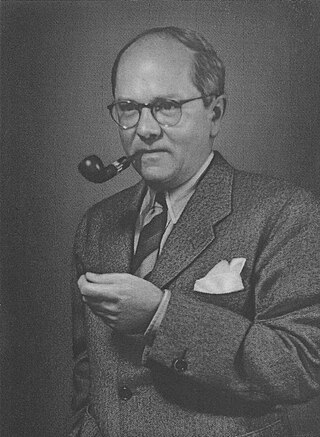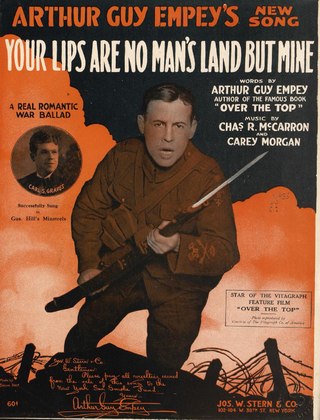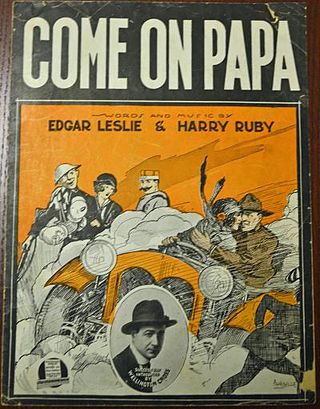
"Good Morning Mr. Zip-Zip-Zip" is a ragtime song published as sheet music in 1918 by Leo Feist Inc. of New York City. It was one of the most popular tunes with United States soldiers during the World War I era.

Richard Armstrong Whiting was an American composer of popular songs, including the standards "Hooray for Hollywood", "Ain't We Got Fun?" and "On the Good Ship Lollipop". He also wrote lyrics occasionally, and film scores most notably for the standard "She's Funny That Way".

Raymond Blanning Egan was a Canadian-born American songwriter of popular music. Many of his songs have appeared in films and musical theatre. He often collaborated with composer Richard A. Whiting.

"Keep the Home-Fires Burning " is a British patriotic First World War song composed in 1914 by Ivor Novello with words by Lena Guilbert Ford.

"When Yankee Doodle Learns to "Parlez Vous Français"" is a World War I song published by A.J. Stasny Music Co. Based on estimates of sales, a performance of the song by Arthur Fields in 1918 was ranked #8 in the United States when it was featured on his Oh! Frenchy album, released by Victor. The lyrics playfully present American soldiers learning French so that they may flirt with women while in France.

"If He Can Fight Like He Can Love, Good Night Germany!" is a World War I song from the perspective of a woman confident that her boyfriend will be a good soldier because he was a good lover. It became a hit after it was released by The Farber Sisters in 1918.

"Somewhere In France Is the Lily" is a World War I march composed in 1918 by Joseph E. Howard with lyrics written by Philander Chase Johnson. It became a hit twice in 1918, charting when released by Charles Hart and by Henry Burr. The song presents a young couple separated by war but held together by love and the sentimental value of lily flowers.

"Your Lips Are No Man's Land But Mine" is a World War I war song. It became a hit in 1918 when released by Henry Burr & Albert Campbell, charting peaking at #2 in the United States.

"Au Revoir, but not Good Bye: Soldier Boy" is a 1917 song composed by Albert von Tilzer, with lyrics written by Lew Brown.

Just a Baby's Prayer at Twilight (For Her Daddy Over There) is a 1918 song composed by M.K. Jerome, with lyrics written by Sam M. Lewis and Joe Young. The song was published by Waterson, Berlin & Snyder Co. The song was performed by Henry Burr and reached number one on the top 100 US songs of 1918. Burr's recording sold a million copies in sheet music and sales.

"Just Like Washington Crossed the Delaware, General Pershing Will Cross the Rhine" is a 1918 song composed by George W. Meyer, with lyrics written by Howard Johnson and published by Leo Feist, Inc.

"We Are all Americans (Allegiance)' is a song written during World War I with music composed by Carrie Jacobs-Bond and lyrics written by Fanny Hodges Newman. It is found in the Library of Congress record of notable music.

The cover has George Washington, Betsy Ross, and her helper.

"Bring Back My Daddy To Me" is a World War I era song released in 1917. William Tracey and Howard Johnson wrote the lyrics. George W. Meyer composed the music. Leo Feist, Inc. of New York, New York published the song.

"And He'd Say, 'Oo-La-La! Wee-Wee!'" is a World War I era song released in 1919. Lyrics and music were written by George Jessel and Harry Ruby. William Baker arranged the song. It was published by Waterson, Berlin & Snyder, Inc. of New York, New York. The song was written for voice and piano.

"Come On Papa" is a World War I era song released in 1918.

Dear Old Pal of Mine is a World War I song written by Harold Robe and Gitz Rice. The song was first published in 1916 by G. Ricordi & Co. in New York, NY.

General Pershing: is a march composed in 1918 by Carl D. Vandersloot and published by Vandersloot Music Publishing Company.

Some Lonesome Night is a song by George W. Meyer with lyrics by Grant Clarke and George Whiting. It was published in 1918 by Leo Feist Inc.
"Lafayette " is a World War I song written and composed by Mary Earl, which was a pseudonym of Robert A. King. It was published in New York, New York by Shapiro, Bernstein, & Co. in 1918. The sheet music cover, illustrated by Albert Barbelle, depicts soldiers marching with fixed bayonets below a statue of Lafayette in silhouette.




















